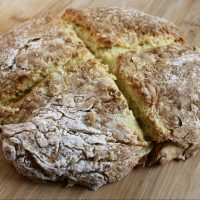What sets Baccalà apart is not just the flavor, but the experience. The transformation of salt cod into a delicacy captures Italy’s resourceful culinary spirit, turning preservation into an art form. Traditionally enjoyed during holidays or on meatless Fridays, it remains a symbol of heritage on Italian tables.
Baccala, Italy’s Classic Salt Cod Dish
Baccalà is one of Italy’s most cherished traditional dishes, rooted in centuries of coastal cuisine and cultural memory. Prepared with rehydrated salt cod, this humble yet sophisticated recipe has become a staple across many Italian regions, each with its unique spin—from the tomato-based Baccalà alla Livornese to the creamy Baccalà mantecato of the Veneto.
The preparation begins days in advance, soaking the preserved fish to draw out its saltiness and restore its tender, flaky texture. Once ready, the cod is simmered or sautéed with simple ingredients like olive oil, celery, sweet peppers, corn, lemon juice, and chopped parsley. The result is a dish that balances the earthiness of vegetables with the briny sweetness of the sea.
What sets Baccalà apart is not just the flavor, but the experience. The transformation of salt cod into a delicacy captures Italy’s resourceful culinary spirit, turning preservation into an art form. Traditionally enjoyed during holidays or on meatless Fridays, it remains a symbol of heritage on Italian tables.
Served warm as a main course or cool as an antipasto, Baccalà continues to inspire cooks with its simplicity, adaptability, and time-honored taste. Its reputation as an enduring part of Italian cuisine is a testament to the lasting legacy of salt-preserved fish.
The Feast of Seven Fishes: A Christmas Eve Tradition with Baccala
Every Christmas Eve, Italian families around the world come together for La Vigilia, better known as the Feast of the Seven Fishes. It’s a night steeped in tradition, devotion, and flavor, where the absence of meat gives rise to an elaborate spread of seafood. Among the seven symbolic courses, Baccalà holds a place of honor, linking the sacred with the seasonal.
This dish, prepared from rehydrated salt cod, connects generations through memory and ritual. Its preparation varies across regions: in Naples, it might be fried in golden batter; in Rome, it is simmered with tomato and capers; in the north, it is whipped into a silky mousse. No matter the preparation, Baccalà carries with it a sense of nostalgia, effort, and reverence.
What makes it special during this feast is more than flavor—it’s its symbolism. Salt cod, once a staple of the poor, represents simplicity and the ability to create beauty out of modest means. The soaking process is itself a form of anticipation, a culinary reflection of the Advent season.
The Feast of the Seven Fishes is more than a meal—it’s an act of remembrance, of faith, and of Italian identity. And on every table where Baccalà is served, there is the reminder that food has the power to bridge past and present, family and tradition, earth and sea.
Salt Cod – and Preserving Fish with Salt
Before refrigeration, salting was one of the most effective ways to preserve fish, and salt cod emerged as the crowning achievement of this practice. For centuries, fishing communities across Europe relied on this method to extend the shelf life of their catch, turning the fresh bounty of the sea into a durable, portable food.
Italy embraced the practice wholeheartedly, and Baccalà became a national treasure. Cod was salted and dried on the Atlantic coast, then traded and sold throughout the Mediterranean. The technique was not just practical; it was culinary. Salt draws out moisture and firms up the flesh, transforming it into something uniquely textured and intensely flavorful.
Rehydrating salt cod takes time—typically 48 to 72 hours of soaking in cold water, with frequent changes. But the reward is a versatile protein that works beautifully in sauces, stews, and sautés. Its firm yet tender texture pairs naturally with olive oil, garlic, lemon, and herbs.
Today, salt-preserved fish continues to play a role in gourmet kitchens and holiday tables alike. The method itself has not changed much since its earliest days. What has evolved is the appreciation: from peasant necessity to cultural delicacy, salt cod—and Baccalà in particular—remains a bridge between old-world ingenuity and modern culinary craft.
Irish Dishes
While Baccalà exemplifies the art of salting, smoking is another ancient method used to preserve and enhance fish. The process of smoking uses gentle heat and fragrant wood to draw out moisture while infusing the flesh with complex, savory flavors.
Smoked fish often begins with a cure—either dry or wet—using salt, sugar, and sometimes spices. From there, the fish is exposed to smoke in two main styles: cold smoking, which flavors but doesn’t cook, and hot smoking, which both flavors and fully cooks the fish. Either way, the result is a preserved product with remarkable depth.
Popular across Scandinavia, Eastern Europe, and the Mediterranean, smoked seafood includes trout, salmon, herring, and mackerel. Unlike salt cod, which requires soaking, smoked fish is typically ready to eat, making it perfect for spreads, canapés, or warm applications like pasta and risotto.
Preserving fish through smoke doesn’t just extend shelf life—it also creates new culinary dimensions. The aroma, texture, and visual appeal of a well-smoked fillet are unlike anything else, offering rustic beauty and refined taste in every bite.
Though methods differ, both Baccalà and smoked fish celebrate resourcefulness and respect for the harvest. They remind us that preserving food is not only about survival—it’s about flavor, tradition, and creativity born from necessity.
Baccala
Ingredients
- 1/2 lb cod, salted
- 2.5 oz corn Roasted 25 min. at 375 with oil salt and pepper
- 2 T celery sauteed or tenderized
- 2.5 oz pepper roasted, diced
- 1 oz lemon juice
- 1/4 cup parsley leaves whole, washed stems removed
- 1.5 oz olive oil
- 1 tt salt
- 1 tt pepper table grind
Instructions
- soak salt cod in milk for 3 days, to remove salt
- drain fish and rinse under cool water
- cook cod in 190 degree (just prior to boiling) water for 2 – 3 minutes
- cool cod
- flake cod into a bowl
- combine all ingredients mix well
- serve on a cracker or on a bed of salad greens





